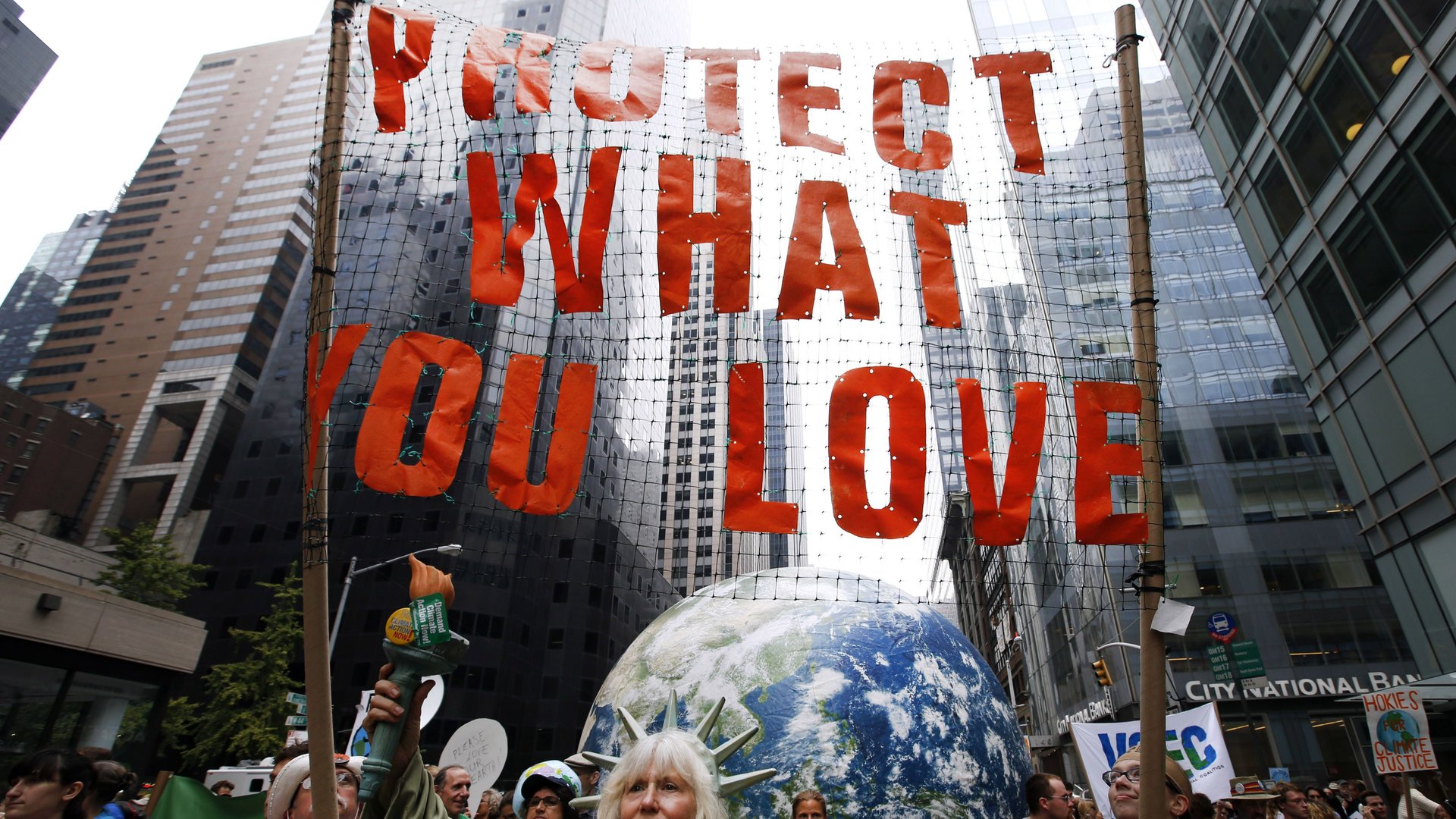The People’s Climate March isn’t even pretending to be non-partisan
Since January 2017, marches along the National Mall have become more or less a feature of weekend life in Washington, DC.


Since January 2017, marches along the National Mall have become more or less a feature of weekend life in Washington, DC.
The largest were the Women’s March, the day after president Donald Trump’s inauguration, and the March for Science last week, organized to coincide with Earth Day. But there have been other, smaller marches too, like the Tax March on April 15 and today’s People’s Climate March (April 29).
This year’s climate march is an echo of the massive one that took place in September 2014, in New York City, two days before the Paris Climate summit. An estimated 400,000 people took to the streets in New York, and there were over 2,600 satellite marches in 161 countries.
Almost three years later, the People’s Climate March is happening again. Except this time, it’s about a lot more than just the climate.
“The goals of this march are really to show our opposition to Trump’s agenda,” says Jamie Henn, the co-founder and communications director of 350.org, one of the major organizers for both the 2014 and 2017 editions.
Anytime a march’s stated purpose is partisan, it runs the risk of alienating those across the aisle. “Generally, we shouldn’t make [climate change] partisan, but we have to acknowledge that it has been made partisan,” says Andrew Bennett, a political scientist at Georgetown University. “That happened not by Democrats moving against Republicans, but by Republicans moving against scientists and climate change.”
To be sure, the original march wasn’t strictly about rallying for action for the environment, either. Back then, the goal was to propagate the idea that climate change was an inclusive social justice movement. It’s motto was “to change everything you need everyone,” and many of its partners were groups that focused on other causes like LGBTQ rights, and racial and gender equality.
But this march seems to be going a step further; it’s designed to be a“strong showing of resistance” to the Trump administration, according to Paul Getsos, the national coordinator for the People’s Climate March. Even the route is more political: marchers will meet on the mall and make their way to surround the White House where they will engage in a peaceful sit-in on the streets before dispersing.
Getsos says this is largely because their priorities have had to change since the election. “We had planned to…make climate an issue for the next president no matter who it was,” he says. “That shifted with the Trump administration. We had to talk about overall justice.”
Although climate change is certainly happening, the fallout is likely a few years away; there are other things happening that could have an effect in the next couple of months. “For some of our core constituents, like immigrants, poor people of color, women, and LGBTQ folk, there are attacks on other issues,” he says. The People’s Climate March says it has been forced to respond to threats even more pressing than climate change because of the vast, diverse support it gathered in 2014.
Republican groups that support climate change—which are few and far between—are wary of this partisan initiative. “A People’s Climate March in and of itself is great to call attention to the issue. Making the March anti-president Trump is immensely harmful,” says Rob Sisson, the president of ConvervAmerica, a group of republicans, conservatives, and independents focused on environmental conservation. “A chorus of voices asking the president to be this generation’s Theodore Roosevelt and to act to address emissions would be much more productive. The US has led the developed world in reduction of harmful emissions, largely through switching from coal-fired plants to natural-gas generation.”
It might be a bad time to alienate climate change activists who come from the political right—just as the conservative climate movement is gaining momentum. For example, there’s now a bipartisan congressional caucus dedicated to climate change, called the Climate Solutions Caucus, that insists on keeping its membership equal across party lines. And in February of this year, senior Republicans met with Trump to try to convince him to adopt a carbon tax.
ConservAmerica won’t be participating in the march on Saturday, Sisson says, because it is too focused on its Zero Emission energy tax proposal, which they are working to draft with lawmakers in congress. Henn counters that Republicans who dislike Trump’s environmental policy—parts of which are predicted to basically sanction pollution—would be welcome to join them on Saturday.